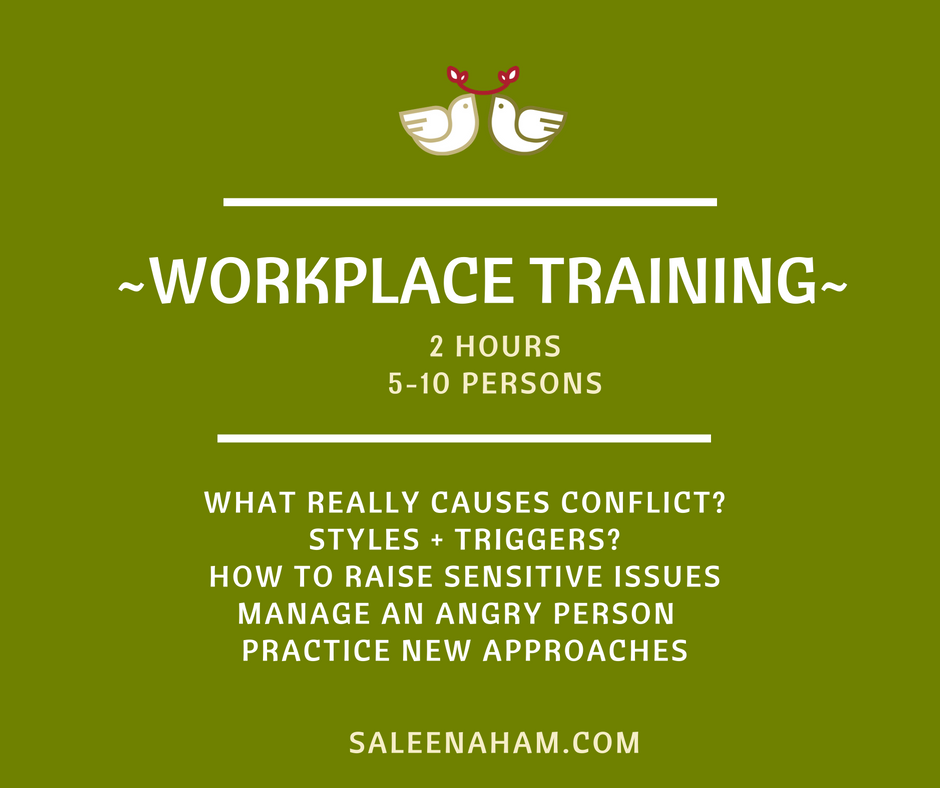Collaborating takes a good deal of maturity, especially when you need to work with the enemy to achieve an end goal. You need to get the job completed without making yourself vulnerable to being undermined, attacked or badmouthed.
Do you have to work with someone you don’t like or who you don’t trust? It’s not easy!!
It’s easy to be trapped into a string of behaviours to defend and protect yourself – that end up making you look like the bad guy! It’s also easy to be constantly expecting to be ripped off, put down or left out.
This is a factor that has to be managed.
Where to start?
Rules for Collaborating
There need to be agreed and clear rules for collaborating. These are the governance and accountability frameworks. They are the benchmarks for behaviour.
Collaboration is about trust. Some needs to be created. It helps to set a foundation with preliminary discussions around purpose, values, priorities and measurable gains.
In collaborating, every voice matters and has an equal right to be considered. There needs to be a sense of safety to assess risk and give it a go. If it does not work, it’s not a witch hunt. It’s a lesson and a cue for some redirection, more experimentation.
Without these foundations, there is too much energy spent on competing, on protection of interests, of personality conflicts and on power plays. The rules need to be able to put these on the table and address them.
Seeing Another Viewpoint
While ability to stand in the shoes of the Other is pretty important to working through disagreements, finding empathy for the enemy can be a big challenge. Without it, collaborating feels unsafe and will probably be ineffective.
You need to be super careful that you aren’t making up problems that you fear but which don’t actually exist.
We all have our bias. We all interpret to make sure there is consistency with our beliefs. It is very frustrating when an Other does not see sense, does not see things the way we do. Their world is shaped differently to ours.
It is so frustrating when the person we disagree with cannot see things any way but theirs! When they are unable to recognise that there just might be another side to the story, another way of interpreting what happened.
Start with reflection about your Self.
My World View Is My Only Truth
Once positions are taken publicly they are become attached to my belief and picture of Who I Am. So any dispute that challenges these is not just some random disagreement between our different perspectives. If it cannot be recognised as simply another World View, if it cannot be separated from my sense of Self, it escalates.
My identity is under attack. My values are being questioned. Therefore it becomes a moral issue.
Accepting or evening hearing a difference of world view is now transported into a bigger, deeper symbolic Story about what is just, what is moral, what is good or evil, what is sane or mad.
And empathising with you is effectively asking me to compromise my set of values. This triggers threat to a number of key needs.
For example, it can feel that it threatens what I have established as my identity and values and changing that may have implications, for my social networks, for my social standing. I may be left vulnerable because I am ‘inconsistent’. I may fear shame will be attached to a shift in perspective.
I begin a certain story about the failings of the Other. Maybe unjust, immoral, evil, mad and bad.
And as this may make me vulnerable, which sets of survival response and that requires me to attack and defend to keep myself safe from danger.
The whole thing is ramped up because empathy with you is harder for me to imagine when there is a lot more of Me at stake.
Public Declarations Lock In Positions
When I have entrenched myself in a Position and backed that with announcements, stories, statements with my friends, colleagues and the World – backing away from this is going to be embarrassing.
It’s going to be an inconsistency. I may lose ‘face’. I may look like an idiot! I may endure shame or fear if it is shown that my behaviours were not, in fact, justified, because actually {whisper} I was wrong.
It is easier to keep my public Position, demonising the Other and justifying my Self, than to take a risk of being seen to have been mistaken about the situation.
To change that public position may raise questions about my character and integrity which might affect my personal standing. It may raise questions that are not aligned with my announced Values and Identity.
My Personal Experience Shapes My Values
My personal experience of difference may be quite small or narrow. My exposure to different people, in their cultures, styles, opinions, politics, beliefs, ways of doing life, family and social connection may mean that it is hard for me to appreciate that Difference is safe.
If the diversity that exists amongst humans is unknown to Me, not in my experience, I might be quite uncertain about what difference means for me.
That difference may worry me; it might frighten me. If I don’t know much about why you are so different to me, I could think of lots of reasons why you might be threatening.
If I can’t imagine it is possible to be quite different to me and still be ok, I might feel uncertain about whether you are safe. If I have had one type of exposure to life, I won’t even realise that I have blinkers on that stop me from seeing other possible Truths.
That makes it more difficult to appreciate or understand you in your difference or to accept that there are many ‘truths’ in the way life is lived.
I might also label you so it’s clear you are Other, to set the boundaries, keep you out, make it known how you are different to me and a threat to something important to me.
Nasty labels can be used as loaded shortcuts and generalisations are easily applied. We think about what always happens, or never happens. These statements are just too easy and mostly wrong.
Allowing empathy for you might make me a threat to those things, too.
Once you are labelled, I know who you are, so I don’t need to ask questions. I know what that label means.
What Collaborating is Not
Challenging mindsets is uncomfortable. There’s no getting around it. It takes personal maturity to understand that difference of opinion or perspective, is not a threat to my personal identity or values.
Collaborating is about trust and respect. If we are able to recognise that we share feelings, interests, fears, concerns and the possibility of misinterpretations with the Other, the Enemy – then that is a starting space that can overcome mistrust and a sense of separation.
But there are some things collaborating is not.
Empathy is not sympathy. Empathy is being open to the experience of an Other while Sympathy is feeling sorry for them. Sympathy is where the Other needs rescuing or someone to make decisions for them.
Sympathy robs people of power by turning them into Victims of the situation.
Empathy recognises that the Other has choice and capacity and asks questions trying to understand their situation, checking in to see if this is correct and seeking to understand emotional experiences, ideas and options from the perspective of the Other.
Walking the Collaborating Talk
Does this apply to you? Can you shift perspective on collaborating by thinking differently?
Think about a dispute or disagreement you have – and think about how you feel about the Others in that. Don’t judge it – it is what it is.
You have your reasons.
But experiment now. See if you are willing to see things from their perspective, just for a minute or two, here safely on your own.
Could you pause your own Story and privately think about what might be important to them? If you were them…what might you be thinking?
If you were them, what might you be feeling, fearing, finding?
Sometimes working with their side of the experience can show up issues that lie underneath the obvious ones and that can be helpful in fixing the true problem.
This is possibility.
To empathise with the Enemy does put your mindset at risk. It might change your Story. It might mean shaking the fears and facing the possibility of a different ‘truth’.
It means working with the underlying issues rather than a band-aid answer that only addresses the symptoms of the true problems.
There is no threat here as this choice is always in your hands. You get to decide what value might come from seeing the world a different way.
The challenge then is where you take this. Your thinking needs to be tested with the Other to see if it true.
Collaborating fails when we are fearful that our team members are the enemy. Mindsets need to change to accommodate diverse world views and values.
Can you carry your possible discoveries and insights into communication with the Other?
Being able to practice empathy is a powerful way of shifting or working through conflict and forging the framework for collaborating. It takes willingness and maturity and compassionate courage.
Saleena Ham









